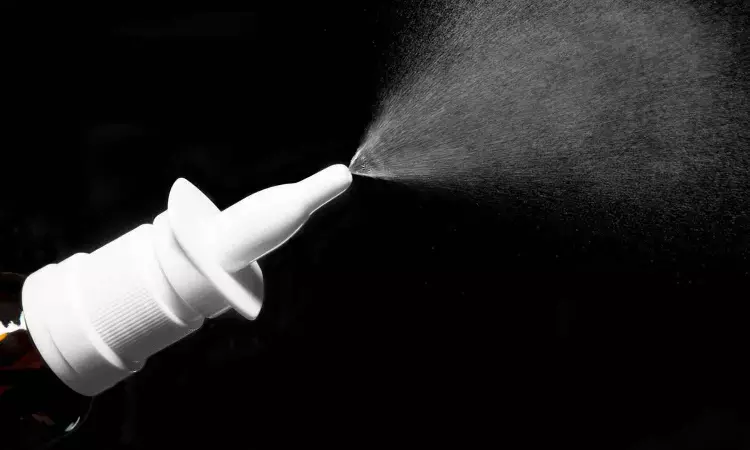- Home
- Medical news & Guidelines
- Anesthesiology
- Cardiology and CTVS
- Critical Care
- Dentistry
- Dermatology
- Diabetes and Endocrinology
- ENT
- Gastroenterology
- Medicine
- Nephrology
- Neurology
- Obstretics-Gynaecology
- Oncology
- Ophthalmology
- Orthopaedics
- Pediatrics-Neonatology
- Psychiatry
- Pulmonology
- Radiology
- Surgery
- Urology
- Laboratory Medicine
- Diet
- Nursing
- Paramedical
- Physiotherapy
- Health news
- Fact Check
- Bone Health Fact Check
- Brain Health Fact Check
- Cancer Related Fact Check
- Child Care Fact Check
- Dental and oral health fact check
- Diabetes and metabolic health fact check
- Diet and Nutrition Fact Check
- Eye and ENT Care Fact Check
- Fitness fact check
- Gut health fact check
- Heart health fact check
- Kidney health fact check
- Medical education fact check
- Men's health fact check
- Respiratory fact check
- Skin and hair care fact check
- Vaccine and Immunization fact check
- Women's health fact check
- AYUSH
- State News
- Andaman and Nicobar Islands
- Andhra Pradesh
- Arunachal Pradesh
- Assam
- Bihar
- Chandigarh
- Chattisgarh
- Dadra and Nagar Haveli
- Daman and Diu
- Delhi
- Goa
- Gujarat
- Haryana
- Himachal Pradesh
- Jammu & Kashmir
- Jharkhand
- Karnataka
- Kerala
- Ladakh
- Lakshadweep
- Madhya Pradesh
- Maharashtra
- Manipur
- Meghalaya
- Mizoram
- Nagaland
- Odisha
- Puducherry
- Punjab
- Rajasthan
- Sikkim
- Tamil Nadu
- Telangana
- Tripura
- Uttar Pradesh
- Uttrakhand
- West Bengal
- Medical Education
- Industry
Early-stage clinical trial demonstrates promise of intranasal influenza vaccine in generating broad immunity

Researchers at the University of Maryland School of Medicine's Center for Vaccine Development and Global Health (CVD) reported encouraging results from an early phase clinical trial that found an experimental intranasal vaccine triggered a broad immune response against multiple strains of H5N1 “bird flu”. The study, published today in the journal Nature Communications, highlights the potential of mucosal immunization strategies--where vaccines are squirted into the nostrils--to prime immune defenses against diverse influenza strains.
The spread of H5N1 influenza in animals with spillover into human populations globally highlights the critical need for effective countermeasures to protect our communities from this and other pathogens with pandemic potential,” said study corresponding author Justin Ortiz, MD, MS, Professor of Medicine at the University of Maryland School of Medicine (UMSOM) and vaccine researcher at CVD. “This trial shows that this intranasal, shelf-stable H5N1 vaccine could play a major role in pandemic preparedness, offering a practical and scalable way to help protect people from evolving strains of the virus.”
Current influenza vaccines, administered intramuscularly, primarily induce systemic immune responses that protect against symptomatic illness when well-matched to circulating strains. However, these vaccines may be less effective at preventing the spread of infection from one person to another. Mucosal vaccines, delivered intranasally, aim to stimulate immunity at the site of infection, offering a promising approach to reduce transmission.
In this randomized, controlled trial, 40 healthy adult volunteers were randomly assigned to receive different doses of an H5 flu vaccine with BlueWillow’s NanoVax® W805EC adjuvant. Control groups received a placebo or a high-dose of the H5 vaccine without the adjuvant. Six months later, all volunteers received an intramuscular H5 flu booster.
The NanoVax H5 intranasal vaccine was found to be safe and well tolerated. Importantly, only people who received the boosted nasal vaccine showed strong immune “priming”—meaning their immune systems were activated and ready to respond—as revealed later, when they were given a single dose of an intramuscular H5 flu shot. Even on its own without a booster, the NanoVax H5 intranasal vaccine triggered mucosal and systemic immune defenses —something other intranasal recombinant H5 flu vaccines have not achieved in clinical trials.
“The vaccine also helped the immune system recognize multiple versions of the H5N1 virus, which is key because there are different versions of the virus and they change over time,” said study co-lead author Meagan E. Deming, MD, PhD, Assistant Professor of Medicine at UMSOM. “The use of the adjuvant also suggests this approach might allow for lower doses of the vaccine, which could make our current vaccine stocks available to more people in the event of an outbreak.”
Specifically, the study found that volunteers who received the adjuvanted H5 vaccine had strong immune activity including higher levels of protective antibodies (IgG and IgA), more memory immune cells, and better ability to kill infected cells.
“These findings demonstrate successful mucosal priming and the potential for broad cross-clade immunity,” said study co-lead author Franklin R. Toapanta, MD, PhD, Associate Professor of Medicine at UMSOM. “The intranasal vaccine’s ability to elicit mucosal and cellular immune responses, coupled with strong antibody-dependent cell cytotoxicity, underscores its promise as part of next-generation influenza prevention strategies.”
Reference: Deming, M.E., Toapanta, F.R., Pasetti, M. et al. An intranasal adjuvanted, recombinant influenza A/H5 vaccine primes against diverse H5N1 clades: a phase I trial. Nat Commun 16, 9321 (2025). https://doi.org/10.1038/s41467-025-64686-3
Dr Kamal Kant Kohli-MBBS, DTCD- a chest specialist with more than 30 years of practice and a flair for writing clinical articles, Dr Kamal Kant Kohli joined Medical Dialogues as a Chief Editor of Medical News. Besides writing articles, as an editor, he proofreads and verifies all the medical content published on Medical Dialogues including those coming from journals, studies,medical conferences,guidelines etc. Email: drkohli@medicaldialogues.in. Contact no. 011-43720751


